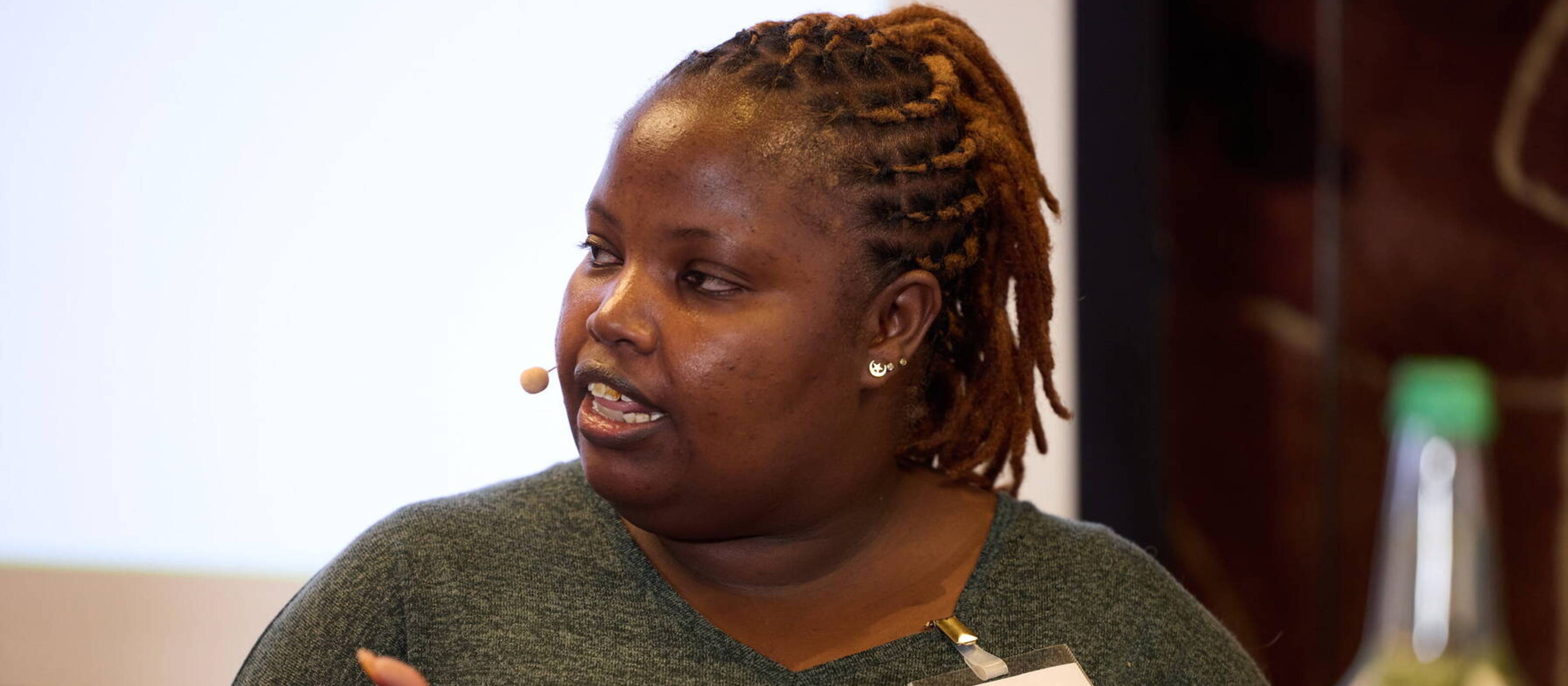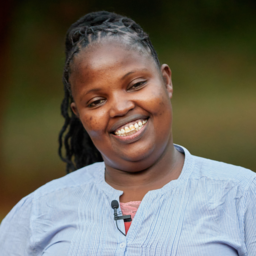

«In Kenya, the impact of climate change is a pressing matter of survival»
Winnie Cheche, Volunteer Communication Director of the Kheri Environment Action Network in Kenya, is a well known climate activists in Africa. She visited Switzerland in November at the invitation of Caritas Switzerland. Three months after her trip, we asked her about her experiences and insights during her visit as well as her plans.
During your visit to Switzerland, you met with members of the Swiss parliament who are politically committed to climate protection. What insights did you take away from this exchange?
Discussions with Swiss parliamentarians highlighted a significant gap in the communication of Africa's climate realities on the global stage. It's evident that political dynamics heavily influence the level, nature, and effectiveness of climate action support for Africa.
A key insight from these conversations was the prevalent lack of awareness regarding local climate initiatives. Many decision-makers often overlook the complexity of certain trade-offs, mistakenly believing they are easily manageable. However, for local communities, these trade-offs are critical for their survial.
Moreover, there appears to be a substantial misunderstanding of the true scale of climate change's impacts in Africa. This lack of comprehension poses challenges in justifying the urgent financial support required when climate action funds are proposed in parliaments of the Global North, such as Switzerland.
You also took part in a Caritas symposium and a discussion event with climate activists. What surprised or moved you the most?
The differing perspectives on climate change between Switzerland and Kenya highlight a significant contrast. In Switzerland, discussions often focus on policies, targets, and financial frameworks related to climate action. In contrast, for many communities in Kenya, the impact of climate change is a pressing matter of survival. This stark reality emphasizes the urgent need for addressing climate injustice. It is encouraging to observe that some individuals in Switzerland are eager to engage with and understand these challenges. Their interest in amplifying the voices of those affected in Africa suggests that there is potential for building global solidarity in the pursuit of climate justice.
What demands do you and your fellow activists from Kenya have of countries like Switzerland, given their high CO2 emissions?
We demand climate justice. This means that rich countries, like Switzerland, must acknowledge their historical responsibility for the climate crisis and take tangible actions to support countries like Kenya, which are disproportionately affected. These actions should include increased climate finance, loss and damage compensation and strong emission reduction commitments.

The differing perspectives on climate change between Switzerland and Kenya highlight a significant contrast. In Switzerland, discussions often focus on policies, targets, and financial frameworks. In contrast, for many communities in Kenya, the impact of climate change is a pressing matter of survival.Winnie Chechekenyan climate activist
What are the main challenges that people in Kenya are currently facing due to the climate crisis?
- Severe Droughts and Food Insecurity: Many regions in Kenya, particularly arid and semi-arid areas, are experiencing prolonged droughts. This situation is causing crop failures and significant loss of livestock.
- Flooding and Displacement: Erratic rainfall patterns have resulted in devastating floods that destroy homes, displace communities, and increase the spread of waterborne diseases.
- Biodiversity Loss: Climate change poses a significant threat to Kenya’s rich biodiversity. Habitats are being destroyed, and various species are struggling to survive.
What climate-related projects are you currently working on with your organization?
Unfortunately, due to unsuccessful grant applications, I currently have no personal projects running. However, I am still educating and creating awareness through blogging and social media platforms.
What are your plans for the future?
I am committed to elevating African voices in climate discussions and advocating for equitable solutions that prioritize local communities. My plans include:
- Expanding environmental education programs to engage more young people and empower them to take action by launching a podcast.
- Strengthening advocacy for climate justice at international forums through speaking opportunities, ensuring that African realities are included.
- Engaging in policy discussions to promote public participation to advocate for stronger climate action at both local and global levels.
- Developing more community-led initiatives that focus on sustainable livelihoods and climate adaptation.
What gives you the strength to remain optimistic despite the immense challenges posed by the climate crisis?
My strength comes from the resilience of the communities I work with. Witnessing young people, farmers, local communities, and activists taking action despite limited resources inspires me to keep moving forward. Nature itself also serves as a source of hope, every time I see a tree we've planted growing or a community finding a way to adapt, I am reminded that change is possible. Also, the solidarity from fellow activists around the world reassures me that we are not alone in this fight.
Thank you for the interview and your visit to Switzerland, Winnie Cheche. We wish you every success with your projects.
Key takeaways from the presenters and debaters of the recent Caritas Symposium on Balancing Climate Protection with Poverty Reduction statements from Winnie Cheche
Further informationen
Contact

Angela Lindt
Head of Development and Climate Policy advisory service+41 41 419 23 95alindt@caritas.ch
Header image: Winnie Cheche on the podium at the Caritas Symposium 2024. © Danny Schulthess